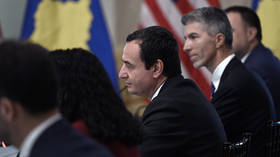Kosovo delays crackdown on Serbs
Advised by the US ambassador, Pristina delays ban on Serbian documents that triggered protests
Authorities in the breakaway Serbian province of Kosovo announced late on Sunday they would postpone the implementation of their ban on Serbian license plates and identification documents until September 1.
The US ambassador reportedly urged Pristina to do so, as Kosovo police were met with roadblocks erected by local Serbs and NATO peacekeepers deployed to prevent clashes.
The delay was accompanied by a demand from PM Albin Kurti’s government that the Serbs dismantle their barricades, according to Pristina-based TV station Dukagjini, which said that Kurti’s decision followed a request by US ambassador to Kosovo, Jeffrey Hovenier.
Postponing the measures is necessary due to “misinformation and misunderstandings” about its nature, the outlet quoted Hovenier as saying. The US only asked for the implementation to be postponed, not canceled, he added.
Serbs in the north of the breakaway province had set up roadblocks and rung alarm bells earlier in the day, as heavily armed special police under Pristina’s authority took control of two administrative crossings with Serbia. Kurti’s government insisted that they would start barring vehicles with Serbian-issued license plates and other documents, in the name of imposing “law and order” on the entire territory of the province.
Both the local Serbs and Belgrade have objected, pointing out that Pristina has repeatedly failed to honor its obligations to respect the Serbs’ civil and human rights. Serbian President Aleksandar Vucic said the Serbs “will not suffer any more atrocities,” and vowed to “win” if the ethnic Albanian government persisted in “persecuting, harassing and killing Serbs.”
Kurti’s government responded by accusing Vucic of masterminding the illegal roadblocks, aimed at undermining the “democratic and progressive” Kosovo. President Vjosa Osmani’s chief of staff also claimed Belgrade was acting as a proxy of Russia.
Amid unconfirmed and often conflicting reports of armed Albanians massing on approaches to Serb-majority towns and gunfire that may or may not have injured civilians, NATO’s peacekeeping force in the province, KFOR, announced it was “prepared to intervene if stability is jeopardized.”
Meanwhile, Russia accused Pristina of deliberately escalating the situation as part of NATO’s effort to target Serbia. Kosovo and its US and EU backers to “stop provocations and respect the rights of Serbs,” Foreign Ministry spokeswoman Maria Zakharova said on Sunday.
On Sunday evening, Vucic held talks with the KFOR leadership from the headquarters of the Serbian General Staff. After emerging from the building shortly before midnight, he told reporters he was optimistic about a peaceful resolution.
“I hope this will de-escalate by tomorrow, and that we will be able to reach a solution in the coming days,” Vucic said, adding that the KFOR commander will hold talks on dismantling the roadblocks with the local authorities in Kosovska Mitrovica.
“In the coming weeks and months we face the hardest political fight ever, so I thank everyone for their restraint, most of all the Serbs in Kosovo,” said Vucic. “There will be no surrender, and Serbia will win.”
NATO occupied Kosovo in 1999, after a 78-day air war against what was then Yugoslavia. The province declared independence in 2008, with Western support. While the US and most of its allies have recognized it, Serbia, Russia, China and the UN in general have not.






Comments are closed.